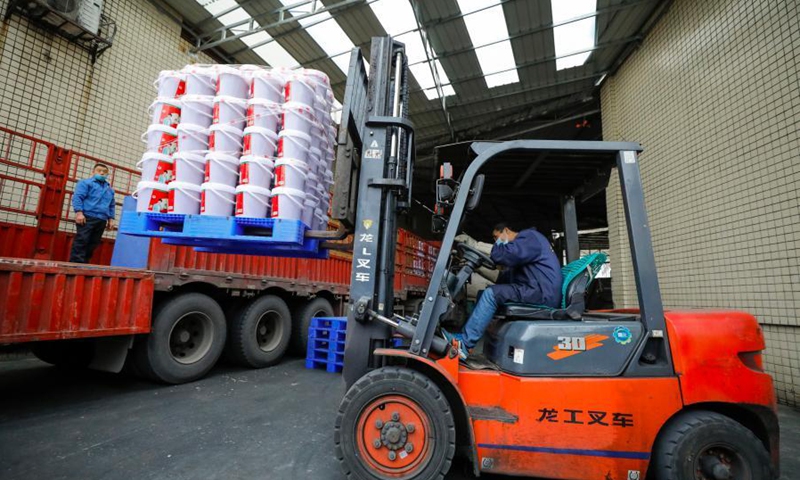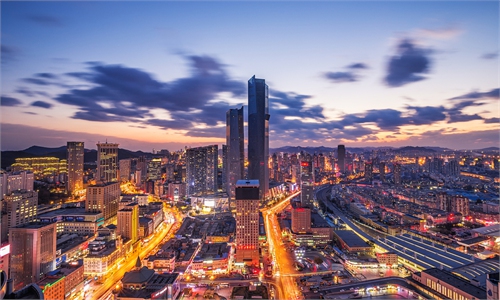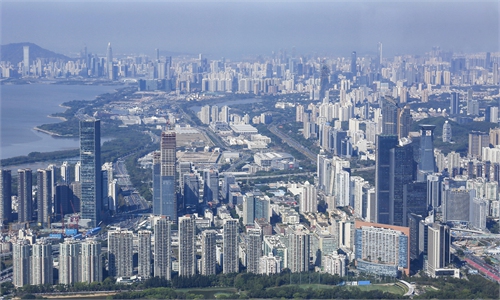
Workers load bean paste products on a truck at a factory of Dandan Pixian Bean Paste Group Co., Ltd. in Pidu District of Chengdu, southwest China's Sichuan Province, Dec. 11, 2020. Pixian bean paste, a condiment with main ingredients including red pepper, broad bean, wheat flour and salt, is characteristically used in Sichuan cuisine. The technique of producing Pixian bean paste has been listed as a national intangible cultural heritage in 2008. By 6 p.m. Friday, Chengdu, capital of Sichuan Province, had reported 10 confirmed COVID-19 cases and two asymptomatic cases in the recent emergence of the epidemic. Bean paste enterprises in Pidu District of Chengdu have taken various preventive measures to ensure the production of Pixian bean paste.Photo:Xinhua
There will be no full-scale backsliding and no U-turns when it comes to macroeconomic policies in 2021, a senior official with the National Development and Reform Commission (NDRC) said on Tuesday, one day after China became the only major economy in the world to post a growth for 2020 with a GDP of 2.3 percent.
Yan Pengcheng, director of the Department of NDRC, said policy planning for 2021 needs to confirm with the practical needs for ensuring stable economic growth and on account of foreseeable uncertainties, and there will be no U-turns when it comes to policies rolled out in wake of the pandemic.
The Chinese economy was resilient in the face of unprecedented challenges in 2020 amid the economic onslaught caused by the coronavirus, with growth in the fourth quarter returning to pre-pandemic level.
The world's second largest economy became the only major economy to record growth last year with a 2.3 percent GDP growth, official data showed on Monday.
The relatively positive economic data has also fueled speculation that targeted policies rolled out last year may be rescinded.
The strength of the economic rebound is putting pressure on the central bank to rein in its pandemic stimulus, with increasing numbers of analysts expecting a rate hike in the second half of the year, according to a research note sent to the Global Times by Rajiv Biswas, APAC Chief Economist at IHS Markit on Friday.
Yan said policymakers will focus on a balance between easing and tightening macroeconomic policies based on real situation, and a "certain level" of sustained supportive policies will be still exercised considering a number of market entities are still under a period of recuperation.
Cong Yi, a professor at the Tianjin University of Finance and Economics, said the tone-setting statement by the economic planning agency is fact based, despite an overall optimistic outlook for growth for the year.
The recovery has yet to lift up in many sectors, uncertainties in the domestic epidemic control situation and the fact that certain industries are still in limbo dictated the policymaking, Cong told the Global Times on Tuesday.
Policymakers need to also consider global uncertainty, including possible continued easing policy by the US, and their impacts on China.
The US dollar has been weakened by US quantitative easing, causing the Chinese yuan to soar and eating away at profits for Chinese exporters, even as they record more orders.
Policymakers also need to factor in the fact that traditional industries, in the process of upgrade and transformation and impacted by the so-called new economy, needs continued support, said Cong.
This week's meeting by the People's Bank of China, the central bank, will be eagerly watched for clues as to the policy trajectory, according to the IHS research note.
However, Cong said China's monetary policies will be honed to provide targeted support to a number of industries while curbs are expected for others, such as the property sector and internet finance.
Global Times


